The big bang poses a big question: if it was indeed the cataclysm that blasted our universe into existence 13.7 billion years ago, what sparked it? Three researchers at Perimeter Institute in Waterloo, Ontario explored a new idea about what might have come before the big bang in a Scientific American cover story called The […]
Category: News tip
Canadian contribution to the next Mars rover
On July 31, Nasa announced the seven instruments that will be included in its next Mars rover, to be launched in 2020. One of the instruments, the Radar Imager for Mars’ Subsurface Exploration (RIMFAX) will conduct shallow profiling of the geological structure of Martian subsurface as the rover drives along the surface. Canadian earth scientist […]
Canada’s contribution to asteroid mission gets underway
On July 17, 2014 the Canadian government announced funding that will help Canadian scientists and engineers build one of the key instruments onboard the US-led OSIRIS-REx mission, which aims to collect and return rock samples from an asteroid called Bennu, which comes within 450,000 kilometres of Earth every six years. (While the Japanese Hayabusa mission […]

Super Cryogenic Dark Matter Search comes to Sudbury
Super Cryogenic Dark Matter Search (Super CDMS) aims to measure the signals from exotic particles called WIMPs (Weakly Interacting Massive Particles) as they pass through a detector made of germanium. It is an international, multimillion dollar dark matter experiment currently based in Minnesota. Funding has recently been announced that will allow SuperCDMS to build a more sensitive […]
Launch of two Canadian nanosatellites
At 15:11:11 Eastern Daylight Time on July 19, 2014, two Canadian-designed satellites were launched from Yasny, Russia. Named BRITE-Toronto and BRITE-Montreal, these devices – no bigger than a car battery – will stare for long periods of time at the brightest stars in the night sky, monitoring shifts in their brightness and colour. Monitoring these shifts […]
Winner – Three Minute Thesis
The winner of the 2014 Three Minute Thesis is Joseph Donahue, a biochemical engineering student from Western University, discussing his work on a portable bioreactor to treat wastewater. See his winning video here and check out the runners up – including the People’s Choice winner – here.
Can information and communications technology (ICT) help produce a greener Canada?
Imagine an app that helps monitor your water usage, or a “smart building” that tints its windows in response to sunlight in order to save on air conditioning costs. Such technologies exist, but putting them to work will require integration on a number of fronts: improving broadband access in all areas of the country; standardizing […]
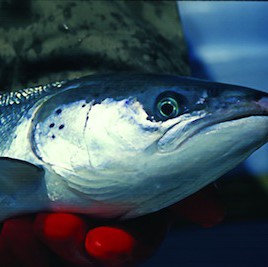
Atlantic Salmon Genome Sequenced
The sequenced genome of the Atlantic Salmon was announced at the 2nd International Conference on Integrative Salmonid Biology in Vancouver. The work was carried out by an international team that included scientists from Norway, Chile and Canada. Atlantic salmon aquaculture is a $600 million industry in Canada. Having a detailed genetic map for this species […]
Launch of a “thermometer for the mind”
A free online brain health test developed by the memory experts at Baycrest Health Sciences can help those aged 50 to 79 assess changes in their memory and determine whether they need to see a doctor. The developers caution that the 20-minute test does not provide a clinical diagnosis, but say it can be a […]
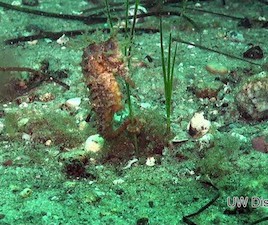
Rare seahorse spotted off Nova Scotia
Two divers recently spotted a lined seahorse (Hippocampus erectus) – rarely seen in Canada – off St. Margaret’s Bay, Nova Scotia. They uploaded the photo to iSeahorse, a smartphone app developed by an international team of seahorse scientists, including UBC marine biologist Amanda Vincent. The ‘citizen science’ initiative is critical due to the fact that […]
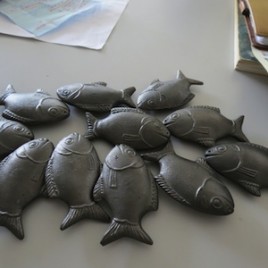
Funding health innovations – the lucky iron fish
Grand Challenges Canada, funded by the Government of Canada, has announced $12 million for projects worldwide aimed at improving the health and saving the lives of mothers, newborns and children in developing countries. Four projects with a proven track record will receive “transition to scale” investments: an example is the “Lucky Iron Fish” developed by a […]
West Antarctica Ice Sheet is Collapsing
On May 12, 2014, two papers were released which indicated that the Thwaites glacier, a major component of the West Antarctic Ice Sheet, is already under collapse, possibly irreversibly. The first paper, accepted for publication in Geophysical Research Letters, was done by researchers from the University of California Irvine and NASA’s Jet Propulsion Laboratory, and was the subject […]
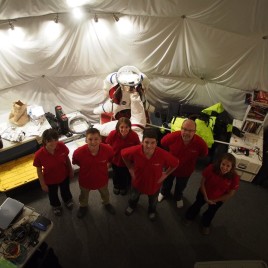
Research uncovering the mysteries of the Red Planet
University of Alberta PhD candidate Ross Lockwood is one of six team members currently camped 8,000 ft. above sea level on the side of a Hawaiian volcano. They are working to advance our understanding of Mars and its potential for life, and have chosen this location for its likeness to the Red Planet. The team is […]
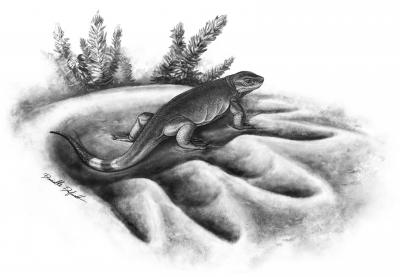
Early plant-eaters evolved from tiny meat-eaters
A new paper shows that giant herbivores evolved from much smaller creatures like the newly discovered Eocasea martini, a carnivore only 20 cm long. The study shows that similar transitions of small carnivores to large herbivores happened independently at least five times, setting the stage for the giant herbivores of 270 million years ago. These carnivores […]

Dogs can sniff out stink bugs in winter before they damage crops
A new study shows that dogs can help us understand ecology of the brown marmorated stink bug. The stink bug is an invasive agricultural pest that was first spotted in Canada in 2012 and has since spread throughout Ontario. Two Labrador retrievers were trained to recognize the smell of the bugs and locate the dead […]
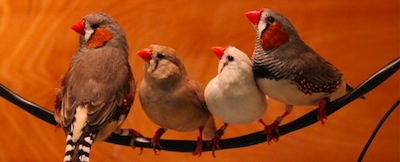
What bird brains can tell us about how we learn
When male songbirds sing to a female, they are note-perfect, but when they are singing by themselves, there are mistakes. By analysing the activity of brain cells, scientists have determined that this random error is actually generated in parts of the brain called the basal ganglia. They suggest that the behaviour is designed to help […]